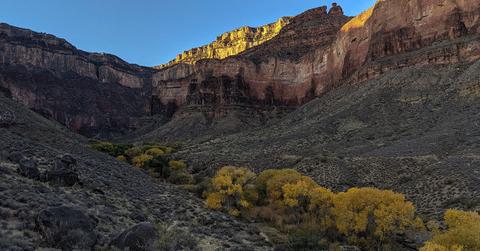Grand Canyon’s “Indian Garden” Renamed to Something More P.C.
Published Nov. 30 2022, 11:34 a.m. ET
Like most of the U.S., many national parks unfortunately took over native land. And while there is no real way to repent for that, the National Park Service is changing the offensive name of a popular Arizona spot, to instead honor the tribe who was forcibly removed from the area.
Grand Canyon's Indian Garden is getting a much-needed name change, thanks to a unanimous U.S. Board of Geographic Names vote. It will now be known as Havasupai Gardens.
If you haven't visited the iconic Arizona park for yourself, this area in particular is frequented by day hikers and backpackers alike, who are embarking on the popular Bright Angel Trail.
“The Grand Canyon National Park team was proud to work alongside the Havasupai Tribal Council in our joint effort to rename this culturally significant location at the Grand Canyon,” Superintendent Ed Keable stated in a press release from NPS.
“The Havasupai people have actively occupied this area since time immemorial, before the land’s designation as a National Park and until the park forcibly removed them in 1926," Keable continued. "This renaming is long overdue. It is a measure of respect for the undue hardship imposed by the park on the Havasupai people.”
The Grand Canyon has decided to change the name of a campground, to honor tribes who were forced out.
As previously mentioned, the U.S. Board of Geographic Names voted unanimously (19-0) to change the name of the Grand Canyon's Indian Garden on behalf of the Havasupai Tribe.
This comes only a few months after the Havasupai Tribe requested to change it, with the passing of Resolution 29-21. The area, which was originally known as Ha’a Gyoh, was inhabited by the the Havasupai people until 1928, when they were kicked out by the NPS. Captain Burro was the last Havasupai person to leave.
Despite the history, Havasupai people still live and work in the national park. NPS is in the process of updating signage and the website with the new name. Although it doesn't fix the past, it's the least they can do, to honor those who were forced out.
“The eviction of Havasupai residents from Ha’a Gyoh coupled with the offensive name, Indian Garden, has had detrimental and lasting impacts on the Havasupai families that lived there and their descendants,” said Chairman Thomas Siyuja, Sr.
“Every year, approximately 100,000 people visit the area while hiking the Bright Angel Trail, largely unaware of this history," he continued. "The renaming of this sacred place to Havasupai Gardens will finally right that wrong.”
Sadly, this isn't unusual — many national parks have a similar history.
Most National Parks have a dark past.
While the National Parks are wonderful in terms of conservation and encouraging outdoor exploration, most of them have an incredibly dark past.
According to National Parks Conservation Association (NPCA), native people were forcibly removed from almost every national park in the U.S. that still exists today.
Tension remains over sacred sites and national parks even years later. Many parks have started honoring tribes, with special holidays and name changes such as these. But it's incredibly difficult to repay the tribes for forcible removal, even years later.
